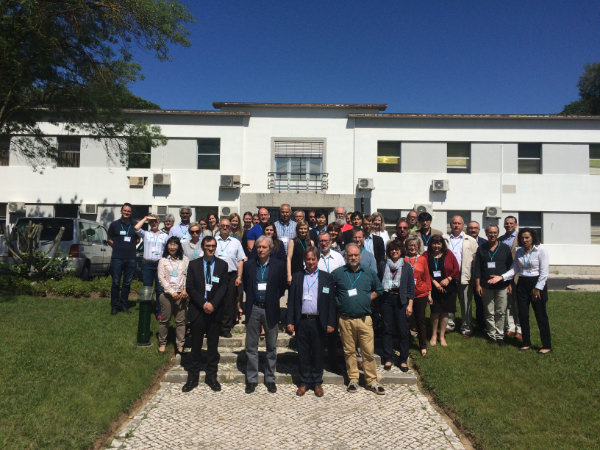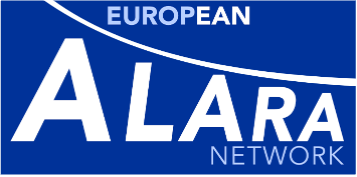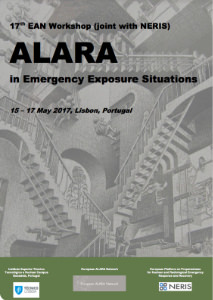Aims and objectives
Emergency exposure situations can arise as a result of a nuclear accident, a malicious or terrorist act, or any other unexpected radiological event. It requires a quick response and sustainable countermeasures and remedial actions in order to avoid or reduce adverse short-term and long-term consequences. Radiation exposures can be received by the public, first responders, workers and volunteers engaged in the post-accident recovery.
The ICRP recommendations and European Basic Safety Standards – the bases for national regulations - re-emphasize the principle of optimisation (ALARA) as applying to emergency exposure situations. For the purpose of radiological protection, reference levels for emergency exposure situations should be set. More importantly, it is necessary to establish emergency plans based on an optimum protection strategy, resulting in more good than harm for the exposed people and the affected territories. In that perspective, lessons learnt from the Fukushima accident are of utmost importance.
The objectives of the workshop were:
- To show, in particular from the experience of Fukushima accident, the challenges posed by the optimisation of exposures in emergency and post-accident situations;
- To review the national arrangements for assessing, monitoring and mitigating the radiological consequences of an emergency, especially with regard to applying the ALARA principle to public and occupational exposures;
- To review the arrangements for managing emergency doses to workers;
- To review the arrangements for providing ALARA-based training for the different types of stakeholders who would be engaged in the emergency response and long-term recovery actions.
Programme and participants
The final programme and the list of participants can be accessed here.
As part of the programme, time has been devoted for discussions in working groups between participants. The working groups tackled the following issues:
- Can the ALARA principle by fully apply in Emergency Exposure Situations for the members of the public?
- Can the ALARA principle be fully apply in Emergency Exposure Situations for the occupationnaly exposed individuals?
- (two working groups) Predict the unpredictable. How to ensure emergency plans are optimal from a radiation protection point of view? How to act if the situation goes beyond prediction?
Presentations
Session 1 - Setting the scene
- EAN and ALARA in Emergency Situations (1.2 Mo) — F. Vermeersch, SCK•CEN & EAN Chairman
- Prepardness from Recovery from Radiation Disaster, Role of the European NERIS platform (153 ko) — T. Schneider, CEPN & NERIS Chairman
- Considerations for the Development of a Protection Strategy for a Nuclear or Radiological Emergency (1.1 Mo) — C. Robinson, International Atomic Energy Agency
- Justification, Optimisation and Dose Limitation following Nuclear Accidents (1.4 Mo); Abstract — A. Nisbet, Public Health England, ICRP TG 93
- Euratom Directive 2013/59 - Elements to be included in Emergency Management System (... kB) — M. Patel, European Commission
- CRPPH Working Party on Nuclear Emergency Matters (WPNEM) (2.3 Mo) — C. McMahon, Environmental Protection Agency Ireland
Session 2 - Overview of Emergency Prepardness in Europe
- The CODIRPA - A French Initiative to Manage Post-Accident Situations, Achievements and Future Challenges (3 Mo) ; Abstract — N. Tchillian, French Nuclear Safety Authority (ASN)
- Optimised Protection Strategies in Nuclear and Radiological Emergencies - the German Example (8.6 Mo) — F. Gering, German Nuclear Safety Authority (BfS)
- Emergency Prepardness in Austria in the light of the new EU BSS including also the ALARA Approach (3.3 Mo) — M. Dauke, AGES GmbH
- Setting Dose Reference Levels for Emergency Responders in the United Kingdom (2.1 Mo) ; Abstract — S. Ely, Public Health England
- Finnish Experience in Emergency Prepardness - Experience of Cooperation and Results (1.3 Mo) ; Abstract — J. Sovijärvi, Finnish Radiation and Nuclear Safety Authority (STUK)
Session 3 - Emergency and Response Management
- A Framework for Training of First Responders and Intervention Teams (4.1 Mo) ; Abstract — L. Portugal, Portuguese Environmental Protection Agency
- Operational Radiation Protection at EDF Rapid Nuclear Response Force (3.1 Mo) — P. M. Eymond, EDF
- J-RODOS: Real Time Decision Support System for Nuclear Emergency Management (1.9 Mo) ; Abstract — W. Raskob, Karlsruhe Institute ot Technology
- CFD Application for Impacts & Risks assessment in the Industrial Areas-Case Studies Fuidyn PAN-EPR for Local Scale Short-Term Releases (4.3 Mo) — C. Souprayen, Fluidyn France
- Optimization and Robustness of Intervention Strategy (1.6 Mo) ; Abstract — C. Murith, Swiss Federal Office of Public Health
- Modelling of Nuclear Accident Consequence on Freshwater Bodies (5.1 Mo) — E. Gallego, University of Madrid
- WHO Recommendations on Iodine Thyroid Blocking (4.8 Mo) — Z. Carr, World Health Organization
- The Experience of Q&A about Radiation in Daily Life after Fukushima Daiichi Nuclear Power Plant Accident (5.5 Mo) ; Abstract — T. Kono, Japan Atomic Energy Agency & Young Researcher Association, Japan Health Society
- Radioactivity from Fukushima Nuclear Accident Detected in Lisbon: Concerns of and Communication with the Public (4.7 Mo) — M. Capucho dos Reis, University of Lisbon, Technologic and Nuclear Campus (IST CTN)
Session 4 - The Post Accident Phase - Management of Radiological Consequences
- Responders On-Site in the Late Phase of a Nuclear Accident - The ALARA Approach (3.1 Mo) ; Abstract — J. F. Lecomte, French Radiation Protection and Nuclear Safety Institute (IRSN)
- ERMIN: European Model for Inhabited Areas: Use within a Wider Decision Making Framework (6.6 Mo) ; Abstract — T. Charnock, Public Health England
- Management of Contaminated Food: the Example of the Irish Dairy Sector (1.6 Mo) — C. Organo, Irish Environmental Protection Agency
- The Use of Electronic Dosimeter for Individual Exposure Assessment and Management after a Nuclear Accident: the Example of D-Shuttle in Fukushima Prefecture (6.7 Mo) ; Abstract — W. Naito, National Institute of Advanced Science and Technology (AIST)
- Efficient Countermeasures: the Basis of post-Chernobyl Remediation and Sustainable Development of the Affected Territories of the Republic of Belarus part 1 (8,9 Mo) part 2 (7.6 Mo) — V. Averin, Insitute of Radiology (RIR)
- Implementating Optimisation in Post-Accident Situation: Some Lessons from Fukushima (1 Mo) ; Abstract — T. Shogo, Japan Atomic Energy Agency
Session 5 - Conclusions and Recommendations
- Introduction to the Working Groups — P. Croüail, CEPN and EAN Vice Chairman (811 ko)
- Report from Working Group 1 - Can the ALARA principle be fully applied for the public in emergency exposure situations? (59 ko)
- Report from Working Group 2 - Can the ALARA principle be fully applied for the occupational exposed workers in emergency exposure situations? (52 ko)
- Report from Working Group 3a - Predict the unpredictable: How to ensure the emergency plans are optimal from a radiation protection point of view? (38 kB)
- Report from Working Group 3b - Predict the unpredicatable: How to ensure the emergency plans are optimal from a radiation protection point of view? (69 kB)
- Final Conclusions and Recommendations (preliminary) — J. Morgan, Public Health England & EAN Secretary

EAN 17th Workshop participants (IST-CTN, Bobadela, Portugal, May 2017)

